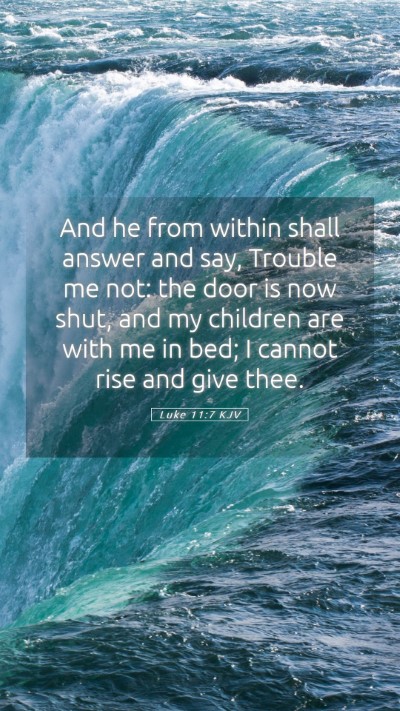Understanding Luke 11:7
In this insightful exploration of Luke 11:7, we delve into the rich meanings and interpretations provided by renowned Bible commentators such as Matthew Henry, Albert Barnes, and Adam Clarke. This passage, which reads:
"And he from within shall answer and say, Trouble me not: the door is now shut, and my children are with me in bed; I cannot rise and give thee." (Luke 11:7, KJV)
offers profound insights into human behavior, prayer, and the nature of God’s responsiveness. Below, we summarize the key meanings behind this verse.
Verse Context
Luke 11:7 is situated within a larger discourse on prayer given by Jesus. It emphasizes the importance of persistence in seeking help and highlights the obstacles that can arise when we approach others for assistance. This context is critical to a proper biblical exegesis.
Commentary Insights
Various public domain commentaries present valuable insights:
-
Matthew Henry: Henry emphasizes that the phrase "Trouble me not" reflects a common human unwillingness to engage when rest or comfort is at stake. He stresses the importance of perseverance in prayer, suggesting that God is unlike this unwilling neighbor; rather, He delights in our petitions.
-
Albert Barnes: Barnes mentions that this verse illustrates a natural human reluctance to extend help when one is already comfortable. He relates this to God's readiness to respond to our needs, enhancing our understanding of divine compassion. He notes that though the neighbor may refuse due to personal inconvenience, God invites us to ask without fear of troubling Him.
-
Adam Clarke: Clarke points out that the door being shut signifies barriers to access. He connects this idea to the spiritual state of individuals who may feel distant from God. The refusal to rise reflects a deeper reality of human frailty contrasted with God’s willingness to answer when we knock in earnest.
Significant Themes
This verse embodies several significant themes:
- Perseverance in Prayer: The emphasis on persistent knocking suggests that believers should not lose heart in seeking divine assistance.
- God's Nature: Contrasting earthly reluctance with divine willingness helps to foster a deeper trust in God’s responses to prayer.
- Community Dynamics: This verse can be seen as a reflection on the social dynamics of community—highlighting both the importance of support and the reluctance to engage when personal boundaries are tested.
Applications to Daily Life
When applying Luke 11:7 to daily living, believers may consider the following:
- Persistence in Personal Needs: Just as the person knocks persistently, we are encouraged to continue seeking assistance from God in times of trouble.
- Trusting God’s Timing: Understanding that while we may face silence or delay, God is ultimately attentive to our cries.
- Overcoming Reluctance: This passage invites reflection on our own willingness to assist others, challenging us to respond with generosity even when it is inconvenient.
Cross References
Related verses that further elucidate the meaning of Luke 11:7 include:
- Matthew 7:7-8: "Ask, and it shall be given you; seek, and ye shall find; knock, and it shall be opened unto you." This directly encourages the act of asking.
- James 1:5: "If any of you lack wisdom, let him ask of God, that giveth to all men liberally, and upbraideth not; and it shall be given him." This illustrates God’s willingness to give to those who seek.
- 1 Thessalonians 5:17: "Pray without ceasing." This emphasizes the need for continual communication with God.
Conclusion
In summary, Luke 11:7 reminds us of the importance of persistence in prayer and the nature of God as one who hears us, contrasting human reluctance with divine willingness. Understanding this verse enriches our approach to Bible study and facilitates a deeper connection with God's promises.
Further Study Resources
For those engaging in online Bible study or seeking Bible study resources, consider utilizing tools such as:
- Bible study guides to deepen your understanding of scripture.
- Online study courses that explore themes of prayer and divine interaction.
- Bible study groups for community-based learning and discussion on challenging passages.


